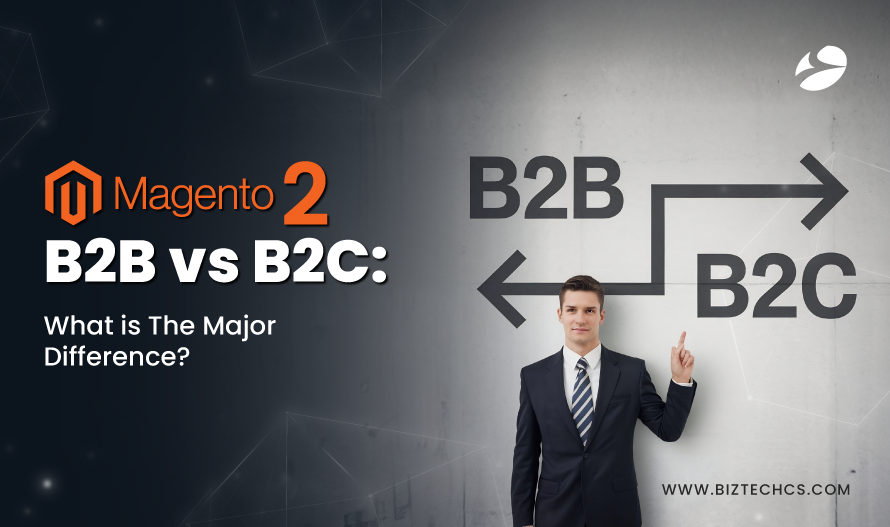4858
Magento 2 B2B vs B2C: What is The Major Difference?
7 min read
4858
7 min read

Magento 2 is one of the best eCommerce platforms that help businesses meet numerous requirements. The solution is also fit for B2B and business-to-consumer, which assists many organizations in operating their web-based stores efficiently.
Though the platform seems to be highly flexible, it is crucial to identify how it encompasses these two different business models. Every model has specific needs and this platform is created with an ability to meet them all effortlessly.
For businesses looking to leverage its full potential, Magento custom development services can play a pivotal role in tailoring the platform to meet their unique needs and scaling their operations effectively.
In this blog post, we will look at the main distinctions between B2B and B2C in the context of Magento 2. This means that each group of goals will be achieved by using appropriate strategies and plans, which will assist the businesses in identifying the right approach to adopt depending on their goals.
Magento B2B is a robust eCommerce solution intended for businesses selling products and services to other businesses. Some of the features available on the site include the facility for entering special prices for stocks and special offers, group buying, and setting up of wholesale and distributor accounts. Magento 2 B2B eCommerce features enable businesses to efficiently manage these functionalities while delivering tailored experiences for their customers.
Business organizations can easily design and develop customer-differentiated price lists to enhance the purchase experience. Furthermore, Magento B2B pricing allows businesses to customize and offer competitive rates, creating a flexible framework for handling bulk orders and discounts. This powerful platform is ideal for Magento B2B eCommerce, empowering businesses to scale operations seamlessly.
In addition, payment and shipment methods, which are multiple in Magento B2B, help make transactions easy and adjustable. Since it is packed with enhanced features, it ensures firms optimize their processes and expand the scope of their online exposure effectively.
Magento B2C is a tool that is helpful to businesses that intend to sell their products to consumers over the internet. It provides solutions for website building and especially for creating online stores, so it is quite suitable for product management, sales, payment, and shipping.
Business owners have the flexibility of choosing and organizing the layout of websites to fit the company branding system and the buying process. Finally, Magento B2C supports mobile-friendly design, thus allowing clients to shop at any given moment.
It has options such as a customer account, wish list, and merchant recommendations to enhance user interactions.
Every company wanting to grow and evolve in the face of market changes will ultimately prefer Magento B2C due to its highly adaptive and easily scalable framework.
|
Aspect |
Magento 2 B2B |
Magento 2 B2C |
| Target Audience | Businesses and wholesalers | Individual consumers |
| Pricing Models | Custom pricing, tiered pricing, and negotiated contracts | Fixed pricing for all customers |
| Account Management | Company accounts with multiple users and roles | Single-user accounts |
| Ordering Process | Bulk ordering, quick order forms, and requisition lists | Standard checkout process for single or few items |
| Quoting System | Request-for-quote (RFQ) functionality for price negotiation | Fixed prices with no quotation system |
| Payment Methods | Support for purchase orders, credit limits, and net terms | Traditional payment gateways like credit/debit cards and PayPal |
| Catalog Management | Custom catalogs for different customers or groups | Single catalog for all customers |
| Customer Segmentation | Advanced segmentation based on business attributes | Segmentation based on customer behavior or demographics |
| Shipping Options | Flexible shipping rules for bulk and split shipments | Standard shipping options for individual purchases |
| Workflow Approvals | Multi-level approval workflows for orders and quotes | No approval workflows required |
| Inventory Management | Advanced inventory systems to support bulk sales | Simplified inventory management for small orders |
| Integration Support | Integrates with ERP, CRM, and procurement systems | Focuses on marketing and CRM integrations |
| Personalization | Personalized pricing and product recommendations | Basic personalization based on browsing behavior |
| Customer Support | Dedicated account managers and sales representatives | Self-service and live chat support |
| Marketing Features | Limited focus on promotions; more on loyalty programs | Rich promotional and discount features |
| Order Volume | Handles high-volume orders with bulk processing | Manages smaller, frequent orders |
| User Interface | Optimized for functional use in procurement processes | Designed for engaging user experience and visual appeal |
Magento Open Source Edition is entirely free, it is the best solution for SMBs looking for a flexible eCommerce platform. It enables firms to create and design their websites, selling products with less capital outlay.
This version has features such as product management, checkout options, and very basic marketing tools. However, businesses require technical skills or a developer to install and run the platform.
Magento eCommerce is more complex and suitable for developing businesses with higher requirements than the simpler and more appropriate Opencart eCommerce platform. It also comprises of features like customer categorization, superior marketing tools, and improved data analysis.
This design offers increased flexibility and can accommodate more business traffic and sales. It usually takes more effort and money to work with Magento than Magento Open Source.
Magento Open Source is perfect for small to middle-sized businesses, while Magento Commerce Cloud is a sophisticated cloud-based version. It has its own built-in hosting arrangement and includes an anti-virus that exceeds traditional anti-spyware and an integrated automatic update system, which minimizes maintenance tasks.
It scales better, is more reliable and performs well using a cloud environment. This version is excellent for those users who want to take advantage of all the additional enterprise options without having to worry about infrastructure.
1. Corporate Account Management – Supports hierarchical company structures and multiple buyer roles with custom permissions.
2. Quick Order and Requisition Lists: Enables bulk ordering via SKU or CSV uploads and saves frequently ordered items.
3. Custom Pricing and Catalogs: Offers personalized pricing, catalogs, and discounts for specific businesses or customer groups.
4. Quote Management: Allows customers to request quotes and negotiate pricing directly within the platform.
5. Credit Limits and Payment Options: Supports flexible payment terms, credit limits, and purchase approvals for B2B transactions.
6. Advanced Reporting and Analytics: Provides insights into sales, customer data, and order trends for business growth.
7. API and ERP Integration: seamlessly connects with ERP, CRM, and third-party systems for streamlined operations.
1. Responsive Design: Optimized for seamless shopping experiences across devices.
2. Flexible Product Management: Supports diverse product types and categories.
3. Advanced Marketing Tools: Includes promotions, discounts, and SEO features.
4. Personalized Shopping Experience: Offers recommendations and targeted content.
5. Secure Payment and Checkout: Multiple payment gateways and one-page checkout.
6. Scalable and Customizable: Easily adapts to growing business needs with extensions.
7. Robust Analytics and Reporting: Provides insights into sales, customers, and performance.
When deciding between Magento 2 B2C and B2B, it’s important to consider your business model and target audience. Magento 2 B2C is a special version for companies that sell to end consumers and includes facilities such as customized shopping carts and simple checkouts.
In turn, Magento 2 B2B is designed for businesses that supply other businesses with related features, such as Magento 2 B2B features, business order quantity, Magento B2B pricing, negotiated price, and purchasing accounts.
Additionally, Magento B2B ecommerce solutions enable streamlined processes for bulk purchasing and account-based transactions, making it ideal for businesses focused on efficiency.
However, if your business involves large orders, negotiations, and repeat transactions, B2B is likely the right choice. Evaluating your customer needs, sales processes, and operational structure can help you make the best decision.
Magento is one of the most efficient solutions for B2B and B2C eCommerce solutions; let BiztechCS help you make it work best for you. Here at Viquanti, we design and develop unique Magento stores based on the requirements of the business and the consumers.
Be it a retail sale or a range of B2B transactions, our team acts to make the shopping experience as smooth as possible. With Magento eCommerce development services and years of expertise, we help you utilize all the features Magento offers, such as default pricing, bulk orders, and multi-channel support.
The solutions are aimed at improving the usability of your products and, as a result, your sales growth.

Odoo
47
By Uttam Jain

Odoo
49
By Uttam Jain

Artificial Intelligence (AI)
82
By Nandeep Barochiya